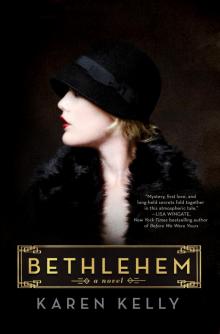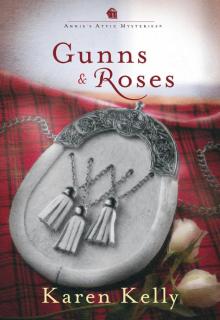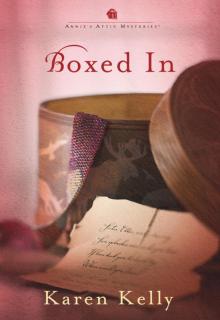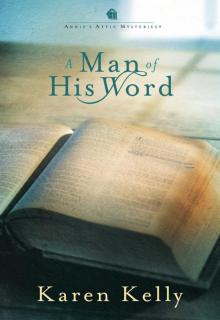- Home
- Karen Kelly
Bethlehem Page 10
Bethlehem Read online
Page 10
But Doe told Joanna that the moment she laid eyes on the strapping young man standing on her doorstep, she knew exactly who he was. Without question, she embraced the boy and pulled him in. She also welcomed the silky sable border collie that sat, absent any tether, pressed against Daniel’s leg. In her typically cryptic manner, Doe told Joanna that it was the dog that had led Daniel to Bethlehem, but she didn’t elaborate, saying it was a story for another time.
That October day, as Joanna read the name on the stone—Lottie—she thought it could be that time. “I heard you weren’t alone when you came here.” Looking at the simple inscription, she gently asked what happened.
“Not long after we got here she started having some trouble. It turned out to be a tumor. There was nothing to do.”
“I’m sorry.”
He didn’t say anything for a few moments, and then—forcing a puff of breath though pursed lips—he sat down. With a tilt of his head, he indicated the ground beside him. As Joanna arranged her skirt on the soft, sun-splashed grass, Daniel leaned back on his elbows and began what would be a full and detailed accounting of the reason he’d finally left everyone and everything he had ever known behind him.
Joanna had known that, despite his reserve, Daniel was uncommonly forthright. Now, as he sketched a portrait of his life in the Community, she discovered that he could also be forthcoming. In the course of a long, quiet narrative, she learned that it wasn’t so much the absence of mechanical progress and modern convenience that he had chaffed at. It was the idea—no, the rule—that individuality was a sin. He told her about the inexorable yearning he had felt—the need to act as his own agent, to live life according to his own beliefs, his own relationship with his own God. Since he could remember, he had been fighting an internal battle against something he didn’t have a name for. Even as he came to understand that selflessness and commitment to the greater good of the Community were perhaps the nobler ambitions, he could never stifle the earsplitting independent streak that whistled through his soul.
But even that existential, conflicted struggle was overshadowed by the incident that finally pushed him over the line.
He explained that his father, Samuel, had an arrangement with the neighbor to the east, a man called Amos Lapp. Lapp and his wife had no children of their own. In exchange for the use of what would eventually be twenty-five acres to augment his corn crops, Samuel would provide his sons to help with the milking of Lapp’s dairy cows. Starting at eight years old, Daniel had risen at five in the morning to go over to the Lapp barn, and would go back again after supper.
With his face to the sun, he closed his eyes as he told Joanna how he had come to love the early mornings. He described the way the horizon made a subtle shift before the sun came up, and the smell of fresh dew in the distant tobacco fields, and the soft whisper of the cornstalks. But he hated the milking. “I had to go there by myself until my brothers were old enough to help. And old man Lapp was an ornery cuss.” He turned to Joanna with a grim smile. “It took me a while to get the hang of it, and he used to stand behind me and yank on my hair right here”—he reached over and grasped a bit of hair just behind Joanna’s temple, giving a light tug—“if I wasn’t doing it right. After a while, it makes your whole head ache.”
When he was fourteen, Daniel told her, he and two of his brothers arrived for the evening milking after supper one night to find Amos pounding in the final post of a wire dog run. Tied to a rail inside the barn was a sweet, lonely-looking border collie with eyes like a fawn’s. Amos Lapp was not the type who went in for pets. Knowing there was a fair market for herding dogs among the many beef cattle farms in the region, Lapp had decided to start a small breeding business.
Daniel had just finished his last year of school—eighth grade was the end of the line—and had moved into his predetermined role in the cornfields. With Lapp’s grudging permission, he began taking Lottie with him as he walked the rows, flushing out crows and any unlucky rodents within her scent. She became his daily companion and he loved her like she was his.
When Lottie had her first litter, Amos Lapp was pleased with the results. So pleased, in fact, that he put her on a severe and exhausting breeding schedule that pushed the little collie to the limits. “She would whelp a litter only to be bred again before she could turn around. For four years running, she had two litters a year. That’s hard on a dog. And I felt so sorry for her when the pups would go. She would sniff around the pen, looking for them. She always seemed so frantic—I swear it broke her heart every time.” Daniel shifted to lean on one arm, straightening out his legs and crossing his ankles. He picked a blade of grass and studied it for a moment.
“One day I had to go over for the second milking by myself. Everyone else was at a barn raising, but I volunteered to go because Lottie was about to have another litter.” He paused, and his shoulders sank a little. “I heard her cry. I thought, you know, something was going wrong with the labor. It was just a sharp, painful-sounding yelp. When I got there, she had only delivered two pups. And they weren’t moving. She was licking them like crazy—trying to get them to move, trying to save them. And then Lapp kicked her. And I knew that was what I’d heard before.” He shook his head, looking directly at Joanna. “I swung at him. I don’t even know how hard I hit him, but I turned back to Lottie, and the next thing I knew I was lying on the floor looking up at Lapp’s wife.”
Joanna sat up straight. “What happened?”
“He knocked me out with a two-by-four. He said I attacked him.” He thought for a moment. “I guess I did. But I wasn’t the one with the wood plank.”
As Daniel described them, the events that happened next were those that decided his future. The incident became a matter for the church deacon, who insisted that Daniel repent. The Community valued penitence over all, regardless of impetus or even—in Daniel’s opinion—logic. But he refused to apologize, and at the end of church the following Sunday, Deacon Wasserman asked Daniel to stand. In public, he asked him to repent for the sin of anger and raising a hand in violence against a neighbor. Again, Daniel refused. The punishment was a six-week shunning.
At this point in the telling, Daniel raised his brow ironically. “Turns out, I didn’t really mind it. I still had to work the crops, but I got to sleep on the porch … eat alone … and I didn’t have to go back to Lapp’s. No more milking. It was funny—my ‘punishment’ had the opposite effect. It was a relief. I’d never really believed in the Ordnung, and I think I knew for a long time I wasn’t going to be baptized. After a few weeks, it came to me that I had to leave.” His eyes were remote, and Joanna could see his Adam’s apple move as he swallowed hard. “So, I got a few things together and said goodbye. My family still couldn’t speak to me. They just cried. Silently.” He took a deep breath. “And when I left, I took Lottie with me.”
And that, in his own succinct words, was it. He never said it, but Joanna knew the cost of leaving his family—and the only life he knew—was greater than any she would ever know. “Did they know where you went? Did they ever come to see you?”
“They can’t. Leaving the Community is the one sin that’s unforgivable. It means a permanent shunning. Old man Lapp managed to make his way up, looking for his dog, but my grandfather told him there was no such animal here. And then he told him where to go.”
* * *
Lost in reverie, Joanna suddenly heard her name. Susannah was looking at her quizzically.
Sitting up straight, Joanna blinked at her mother-in-law. She had been miles away. Or more accurately, about a mile away. “I’m sorry … what did you say?”
“I asked how your day was. Did you have a good afternoon?”
Picking up her spoon, she gave her attention to the dessert. “Yes, lovely, thanks. On a day like this, who could complain?” She hoped the generality of her response would suffice, but Helen—as though complicit with her daughter—pressed the subject.
“I imagine you took a nice walk to enjoy the weather?”
A vague, unsanctioned instinct warned Joanna to answer carefully. She had no reason to lie, but for some reason she hadn’t felt entirely comfortable revealing the progression of her friendship with Daniel. “Yes, I couldn’t bring myself to stay inside. The maples are absolutely on fire. I walked along the bluff over the river—the water looked like it was running through flames.”
There was a small pause before Helen responded. “Have you seen much of Doe lately?” Her tone was casual, but there was a measured, intent look in her eye.
Joanna swallowed before the spoon could reach her lips, and then bought a little time following through with the bite. “Ah no, not really…” In truth, Joanna hadn’t seen Doe at all for the past several weeks. Without acknowledging it, she had been avoiding Daniel’s grandmother ever since the day she’d taken Helen to the cemetery. She had discovered a distant path that curved along the river, and a gate on the far end that was just as convenient if she took a different route from the school.…
“I’ve been busy with the reading circle, and I volunteered to play for the holiday sing-along.” Joanna had been helping out with the advanced reading group in Charlie’s first-grade class, and she could now add piano accompanist to her small list of productive activity, but those things didn’t really account for as much time as she hoped they implied. She was still spending some of her afternoons at the cemetery. She’d been there that very day, in fact, and, as it was a Tuesday, Doe had been busy with her knitting group and shopping. Doe didn’t drive, so Nico was generally out on Tuesday afternoons as well, running errands or sitting with the men at the barbershop, playing cards and spitting sunflower seeds while he waited to pick up his wife. “I did see Mr. Janssen coming out of the hardware store today,” she continued. “He sends his regards.”
Joanna had, indeed, bumped into Nico. Even though—to all outward appearances—she was simply walking down Broad Street, she had felt an unreasonable panic. She had looked over her shoulder all the way to the cemetery to see if the Janssens might be pulling up behind her.
“I wonder if he’s still doing the heavy work, now that his grandson is there. What was that boy’s name?” Susannah asked with vague disinterest. As far as Joanna could tell, she was simply making small talk.
“It’s Daniel.” Helen’s frail voice was surprisingly strong. “I finally met him last month when Joanna took me to the cemetery. He seemed very … capable.” She was looking directly at Joanna, and the word hung in the air.
Capable. Ah, yes. Capable. But of what? Of hoisting stone and scaling heights and cultivating a perfect rose? Of escaping a forbidding life and carving out a new one? Of making Joanna laugh … of listening … of really seeing her? Joanna pulled her shawl close—the evening air had taken on a sudden chill. “It’s getting a little cold out here,” she remarked, hunching her shoulders with a shiver. “I think I may follow your lead and take a nice warm bath.”
She stood and carefully placed her napkin to the left of her dessert cup—all too aware now of the gaucherie of leaving it on the chair. Bidding the women good night, she made an even exit; but she didn’t need eyes in the back of her head to know that two steady gazes followed.
Eight
SEPTEMBER 1924
“Now, aren’t you glad we’re hosting our daughter’s coming-out at home, and not at some hotel in New York or Philadelphia? Or Pittsburgh, for God’s sake?” Hollins Parrish came into his wife’s dressing room, fumbling with a cufflink, giving his arm an impatient shake before refolding the cuff to try again. “Blasted things—I can never get the right sleeve.”
Helen stood up from her dressing table. “I’ll do it. Stand still.”
“I still don’t see why Susannah would want to be just one more goose in the flock. You would think she’d prefer to be the lone swan, gliding in her own pond.”
“My heavens.” Helen screwed the back onto the cufflink and patted the pleats on her husband’s shirt, then turned back to the dressing table. “You’re a veritable poet! I think it was admirable of Sassy to think about the charitable aspect. Some of these balls raise quite a bit of money for good causes.”
Hollins shook his head as he adjusted the chain of his pocket watch. “Charitable causes, my foot. That Bix Buggyback orchestra had more to do with it.”
Helen laughed out loud. “That is the worst name mangling I’ve ever heard. It’s Beiderbecke, which I think you already knew.” She sat down and leaned toward the mirror to apply a careful tracing of lipstick. “But I’m afraid you’re right. I hate to break it to you, dear, but your youngest daughter is a would-be flapper.”
As Susannah’s eighteenth birthday had approached, Helen and Hollins had started making plans to host their daughter’s debut at Brynmor, as they had for India two years prior. But the arrival of engraved invitations to be presented at some of society’s most prestigious affairs piqued Susannah’s interest in a way they had not for India. Her argument stressed the higher purpose of philanthropy, but it wasn’t hard to detect an ulterior, less altruistic motive: jazz. For her sixteenth birthday, her parents had taken her to see Liza on Broadway, and the seed was sown. After that, Susannah followed the Harlem scene with the dogged devotion of a religious postulate. The next year, she finagled another trip to the Great White Way to see Runnin’ Wild, and studied every dance move as if her life depended on it. She pursued her new passion with the same intensity she had previously dedicated to riding, moving the family gramophone into her bedroom to practice the Charleston and the Black Bottom in front of a long mirror, wearing out needles on recordings of Fats Waller and Louis Armstrong, Sidney Bechet and Bessie Smith.
The invitation to be presented at the Philadelphia Charity Ball arrived first, and right away Susannah checked to see which orchestra would be playing. It was Fletcher Henderson’s group—the thought of it gave her goose bumps. As icing on the cake, all Philadelphia debs would be required to participate in a choreographed “kick chorus” at presentation. That meant Susannah would have to take the train to Philadelphia every Tuesday for six weeks to practice. But one man’s bonus is another man’s burden: Susannah’s “fun opportunity” was her mother’s “inconvenient imposition.”
Next came the invitation to the Cinderella Ball in Pittsburgh. Although Helen considered the beneficiary of this one—the Children’s Home—an excellent example of a higher purpose, her husband squelched the idea immediately. “That’s an eight-hour train ride. And the concept is rather absurd, I must say. The Cinderella Ball.” He pronounced the title with a scoff. “Do all of these girls expect to find their Prince Charming there? Must we keep a sharp eye on Sassy lest she abscond in a pumpkin coach?” Pittsburgh was out.
The final invitation was for the Mayflower Ball in New York. When Susannah learned that it would feature Bix Beiderbecke and the Wolverines, she mounted an all-out campaign, starry-eyed with visions of the Roseland Ballroom. The designated charity was the Soldiers Fund, which she was certain would appeal to her father. For a day or two it seemed she might be making some headway—it had come to Hollins’s attention that his good friend Warren Birkland, the chairman of the New York Stock Exchange, would be presenting his daughter there. Susannah hoped that the promise of camaraderie would be extra motivation, but when Hollins saw the itinerary—which required arriving two days early for a host of procedural instructions and practice for the Grand March presentation—he stood firm. “How hard could it be to walk twenty paces with a girl on your arm? All that ridiculous fuss and rigmarole! I can’t see why anyone would want to be part of such a silly production anyway—just another pair of lemmings going over the cliff. No, we’ll have the party here, as we did for Itty. And if it makes you feel better,” he said drily, “I will make a generous donation to the charity of your choice.”
Susannah sulked for several days, but then, at dinner one night, Hollins pulled an ace out of his sleeve. “I’ve been making some inquiries about musicians for the party.” He cleared his throat and there was a telling gleam in
his eye. “There’s a group that’s available for the date and willing to come to us—for a price, of course.…” He grimaced in exaggerated resignation. “They’re called the Wildecats. Ever heard of them?”
Fortunately, Susannah hadn’t yet taken a bite of her food, because her mouth dropped open. “That’s Harry Wilde’s band! You’re not serious?” She had completely forgotten she was holding her fork and it fell out of her hand and clattered onto her plate.
“Yes, well, I had to promise my firstborn son, but I think you’re worth it.”
Kit, home from Princeton on a break, happened to be sitting across from his father. “So glad to see that nothing has changed around here,” he said dourly, giving his sister a long-suffering look. “When I turned eighteen, I remember getting a handshake.”
“Poor old Kit.” Susannah made a pitying little moue. “Subsisting on table scraps and the charity of strangers all this time. As I remember it, that handshake was over a signature on a stock certificate.”
“All right, enough.” Their mother’s mouth was set in a stern line. “We all have more than we need. If I have raised children who are insensitive to that, I don’t want to know about it.” Helen never liked talk of money or acquisitions—it was in the poorest of taste, and she was ever vigilant that her children not take their privileges for granted.

 Bethlehem
Bethlehem Gunns & Roses
Gunns & Roses Boxed In
Boxed In A Man of His Word
A Man of His Word